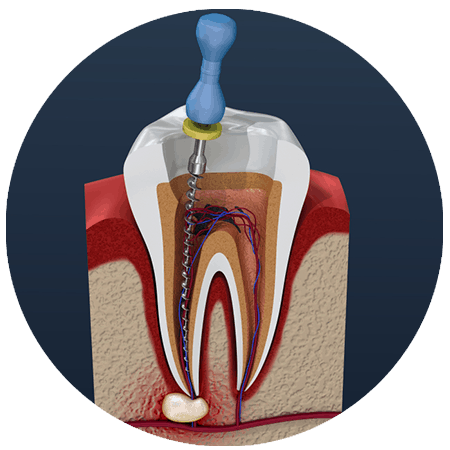Tooth decay or cavities which are neglected for a long time or improper dental filling for previous small cavities and broken filling will result in progression of the non painful cavities to painful tooth ache, which are usually treated by root canal treatment. Root canal treatment is also called as RCT of dental teeth, RC treatment, RCT treatments. Root canal treatment cost/ charges completely depend upon severity of the infection. Completely finished root canal treatment should always be followed with dental cap/ crown. If not, it might lead to re infection in root canal treated teeth this then should be treated with a procedure called as re root canal/ re RCT to save the tooth and extending the life of the tooth without removal of the tooth.
What is Root Canal Treatment?
A root canal is a dental procedure used to treat an infected or inflamed tooth. It involves removing the damaged or infected pulp from the tooth, cleaning and disinfecting the inside of the tooth, and filling it with a material called gutta-percha. The tooth is then sealed with a filling or crown to prevent further infection. The procedure is typically done to save a damaged or infected tooth from extraction.
With the first incidence of pain root canal treatment will give a better result to retain the teeth for a longer period of time and prevent the infection from spreading further.

Let’s learn about the structure of the tooth so that we can comprehend root canal therapy better:
A tooth consists of three layers
- Enamel (hardest tissue)
- Dentine (less harder than enamel)
- Pulp (innermost layer, contains nerves and blood vessels)
If the decay just affects the first two layers of the tooth, filling or restorations can treat it.
An RCT or Endodontic treatment is required in the event that the tooth decay extends to the third layer and results in pulp inflammation or infection.
Who needs Root canal treatment?
Root canal treatment is done to relieve the pain.
Toothache or pain occurs when there is a tooth infection brought on by decay, trauma, and Gum diseases This ranges from mild to severe. As you ignore it, it gets worse.
Root canal treatment procedure:
- Step 1: To determine the extent of inflammation and tooth decay, we may perform one or two X-rays.
- Step 2: The Endodontist anaesthetizes the tooth of interest and the surrounding area.
- Step 3: The root canals and pulp chamber are cleaned using instruments. Cleaning and disinfecting the canals involves using antibacterial and antiseptic solutions. This gets rid of the bacteria and treats the canal infection.
- Step 4: Next, the pulp canals are shaped using instruments so that they will be ready to receive the filling material.
- Step 5: The pulp canals are filled using a rubber-like material called gutta-percha which is compressed against the canal walls, so it fits snuggly and avoids the entry of microorganisms.
- Step 6: The treated tooth is enclosed with a crown, which provides additional strength and stability. The permanent crown is made to look exactly like the natural teeth.
Consequences of skipping RCT:
- The infection may spread into gums and jaw bone and lead to pus filled abscess formation.
- Severe health conditions, such as heart disease and stroke, may also result from this.
- If the pain you're experiencing disappears, it doesn't signify that your teeth have healed over time; instead, it means that the infection has multiplied and the nerves inside your teeth have all died.
Post treatment protocol:
- After the procedure, you will experience some pain and discomfort. So your dentist will recommend medication.
- Avoid smoking, alcohol, hot drinks, drinking with straws. These promote inflammation.
- Brush and floss normally, it’s important to keep the area clean.
- If you experience any complications, consult your dentist.
Frequently Asked Questions
Answer: No, root canal treatment is not painful, as it is carried out under anesthesia.
The patient may feel a little discomfort after the procedure, which can be taken care of by following the prescription.
Answer: Depending on the amount of infection in your tooth, root canal treatment may require one or two appointments.
Answer: Root canal treatment is necessary when the infection spreads to the pulp inside of your tooth.
Answer: Yes, the crown withstands all the pressure of chewing and grinding and provides additional strength.
Answer: The alternative treatment to a root canal is tooth extraction. The extracted tooth can be replaced with an implant, denture or bridge.



